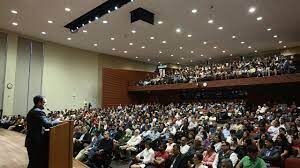In a recent interaction with Indian students at Stanford University in California, Congress leader Rahul Gandhi expressed his surprise at being disqualified from the Lok Sabha but highlighted that it had provided him with a significant opportunity to serve the people. Following his conviction in a 2019 criminal defamation case related to his “Modi surname” remark, Gandhi’s disqualification from Parliament earlier this year marked an unexpected turn in his political career.
During the session at Stanford University, Gandhi candidly shared his thoughts on his disqualification and its impact on his political journey. He admitted that he had not anticipated such a possibility when he initially entered politics. However, instead of lamenting the situation, he emphasized that it had opened new avenues for him to work for the betterment of the people he represents.
Gandhi’s disqualification from the Lok Sabha stemmed from a conviction handed down by a Surat court in the criminal defamation case. The case revolved around his comments regarding his “Modi surname,” which he made during a political rally in 2019. The court’s decision resulted in his temporary removal from Parliament, thereby barring him from participating in legislative activities. However, it is important to note that this disqualification does not impede Gandhi’s ability to continue his political engagement and participation outside of Parliament.
The Congress leader, who represents the Wayanad constituency in Kerala, acknowledged that while his disqualification was an unexpected setback, he viewed it as an opportunity to serve the people in alternative ways. Gandhi’s visit to the United States for a three-city tour presented him with a platform to interact with Indian students and address their questions about politics and governance. By engaging with the younger generation, he aims to inspire and encourage their active participation in shaping the future of the country.
Gandhi’s remarks at Stanford University exemplify his resilience and determination to continue working for the welfare of the people, regardless of the hurdles he may face. Despite his disqualification, he remains committed to his political responsibilities and continues to raise issues of national importance, both within and outside the Parliament.
The Congress leader’s disqualification has not only sparked discussions about the judicial process but has also provided an opportunity to reflect on the broader issues of political accountability and freedom of expression. Critics argue that the criminal defamation case and subsequent disqualification could potentially impede the healthy functioning of a democracy, as it limits the representation of elected officials and restricts their ability to voice dissenting opinions.
However, Gandhi’s perspective demonstrates his ability to transform adversity into an opportunity. While his disqualification prevents him from participating directly in parliamentary affairs, it has not deterred him from pursuing his political goals and engaging with the public. His visit to the United States signifies his commitment to connect with a global audience and exchange ideas on governance, policy, and the future of India.
As Rahul Gandhi continues to navigate through this phase of his political career, his words at Stanford University convey a message of resilience, optimism, and a steadfast dedication to serving the people. While the circumstances leading to his disqualification may have been unexpected, he views this as an opportunity to strengthen his bond with the public, amplify their concerns, and work towards a more inclusive and prosperous India.




